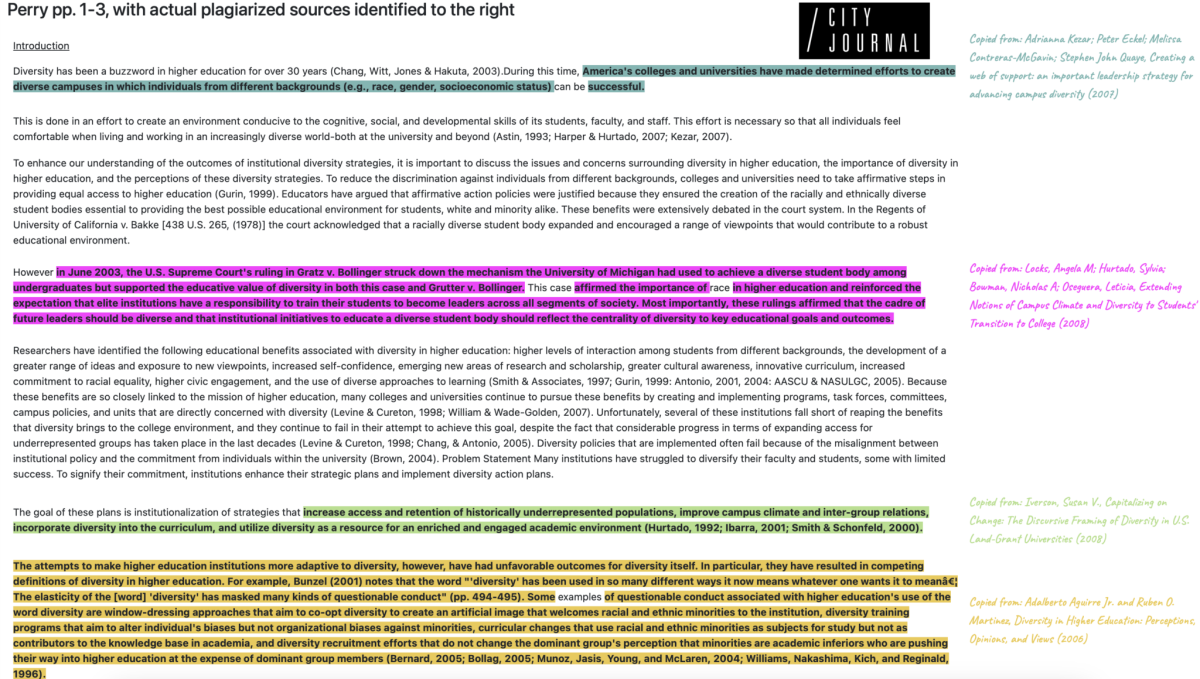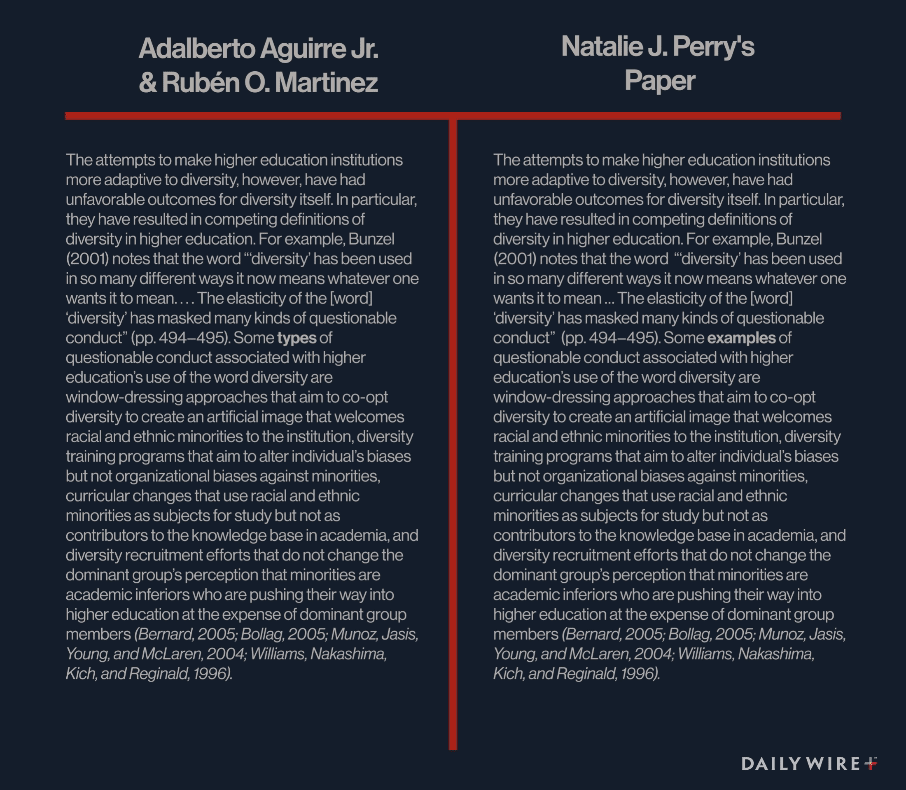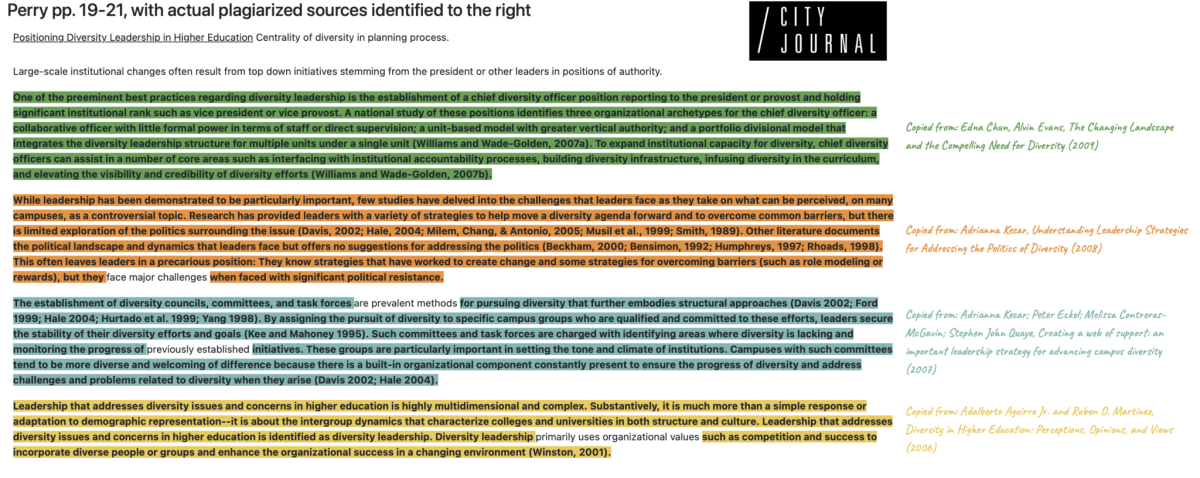
The plagiarism plague has infected UCLA Medical School.
Yet again, a top diversity official has been revealed as a literary thief. This time, reported the City Journal’s Christopher Rufo and Daily Wire’s Luke Rosiak, the culprit is Natalie J. Perry, who leads the university’s diversity, equity, and inclusion program called “Cultural North Star” at the med school.
The writers found that Perry plagiarized major portions of her doctoral dissertation.
The Plagiarism
Noting that med students “were subjected to lessons on ‘Indigenous womxn’ and ‘two-spirits,’” and that “future doctors had to take a class on ‘structural racism,’” the writers concluded that “Perry’s academic career is based on fraud.”
Their analysis of her dissertation, Faculty Perceptions of Diversity at a Highly Selective Research-Intensive University, showed it was riddled with “the worst sort of plagiarism, reproducing large swaths of text directly from several other authors, without proper citations.”
The writers say the literary theft from 10 other papers suggests that Perry is unethical and incompetent.
“In key portions of her text, she copied almost every paragraph from other sources without attribution,” they wrote. “She fails even to mention at least four of the ten plagiarized papers anywhere in her dissertation.”
Perry’s opening three pages “suggest that she did not even bother to read beyond the first page of papers from which she stole,” Rufo and Rosiak wrote:
Her dissertation’s second sentence reproduces verbatim part of a sentence on the first page of a paper by Adrianna Kezar, Peter Eckel, Melissa Contreras-McGavin, and Stephen John Quaye. Her third paragraph, without citation, lifts more than 100 words from the first page of a paper by Angela Locks, Sylvia Hurtado, Nicholas Bowman, and Leticia Oseguera.


Perry’s work didn’t improve from there, not surprisingly.
In summarizing the work of scholars Robert Quinn and John Rohrbaugh, instead of quoting them directly, “she cribbed summaries from other academics.” Thus did she steal without citation “almost all of a nearly thousand-word passage from a paper by Chad Hartnell, Amy Yi Ou, and Angelo Kinicki, without quoting the authors,” Rufo and Rosiak wrote.
For instance, Perry plagiarized all but the seven bold, italicized words in the following text:
The CVF is widely used in organizational literature (Ostroff et al., 2003). Measures of organizational culture that directly or indirectly assess the CVF have been administered in over 10,000 organizations globally (Cameron et al., 2006) within the following academic disciplines: management, marketing, supply-chain management, accounting, social services, hospitality, and health care. Further, the reliability and content validity of Cameron and Ettington’s (1988) measure of the CVF has been empirically supported in studies utilizing multitrait-multimethod analysis (Quinn & Spreitzer, 1991), multidimensional scaling (Howard, 1998), and structural equation modeling (Kalliath, Bluedorn, & Gillespie, 1999). Surprisingly, prior to 2011, there had been limited assessment of the theoretical foundation of the CVF despite its reported content validity and widespread use in research and practice.
Continued Rufo and Rosiak, “the rest of Perry’s analysis of Quinn and Rohrbaugh’s work is largely copied, unquoted and unattributed, from a 2003 paper by John Smart.”
In one section of her dissertation, she copied “almost every sentence” from other authors without credit.


Rufo and Rosiak also revealed the gibberish Perry produced when she couldn’t plagiarize and had to write her own material:
The positionality of the participants informed the perspective on the origins of the commission. /in response to the needs of the varios [sic] stakeholders within the university, the commission addressed issues of diversity on the faculty, undergraduate, graduate, and university level.
“Entrepreneur Mark Cuban recently argued that DEI policies don’t necessarily lower an organization’s expectations,” the two wrote:
But for Harvard, UVA, and UCLA Medical School — where Perry earned her master’s, Ph.D., and DEI position, respectively — this is evidently not the case. These institutions have dramatically lowered expectations for favored groups and pushed a cohort of “scholars” through the system without enforcing basic standards of academic integrity.
Harvard Link
Perry’s link to Harvard is not surprising.
Rufo and others have uncovered four major cases of literary theft at what was once the nation’s most prestigious university.
The latest case, for instance, was sociology professor Christina Cross, whose doctoral thesis includes “verbatim plagiarism, mosaic plagiarism, uncited paraphrasing, and uncited quotations from other sources.”
And, as with Perry’s case, the plagiarizers were in some way involved in the DEI scam that universities run to promote unqualified minorities into positions of power.
Another plagiarist at the disgraced university is Shirley Greene, Title IX Resource Coordinator for Students in the Office for Gender Equity. Riffing off Harvard’s Crimson newspaper, Rufo noted that a complaint revealed that Greene copied “more than 40 passages” in her dissertation about diversity in 2008.
A 37-page complaint revealed plagiarism in the doctoral dissertation of Harvard’s DEI chief, Sherri Anne Charleston, too.
And, most famously, Claudine Gay was forced out as president after Rufo, the Washington Free Beacon, and the New York Post revealed plagiarism in her doctoral thesis and other academic writings.
In a related case, last month, a federal judge fingered a Harvard med school professor, Dipak Panigrahy, for plagiarizing his expert testimony in a class-action lawsuit against defense contractor Lockheed Martin.
Harvard’s website shows that all the plagiarists are still employed.



